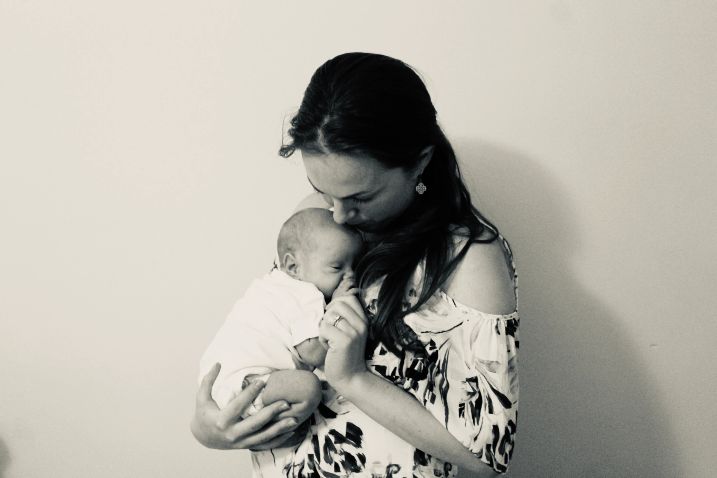What They Don’t Tell You About Motherhood (For Men Too)

[I’ve only done this once before, but below what you will find is not my own work, but the shared insights from a woman named Kayla Iuliano. She shared her insights at a Catholic blog my wife reads. You can find the original HERE, but a bonus at the end of this read is quote from G.K. Chesterton that is seems fitting.]
We deserve so much better than the lies we’re told.
We live in a world that will only tell you about the hard parts of motherhood, and somehow leaves out all the pieces that make it worthwhile.
The world likes to make labor and delivery seem horrible, and it can definitely be a rough journey. Mine certainly didn’t go as planned. It was 40 hours long. I lost a quarter of my blood volume. It was exhausting and terrifying. And yet it was incredibly, powerfully, intoxicatingly wonderful.
And that was the moment I realized that there’s a lot they don’t tell you.
They don’t tell you that labor might be a storm of your deepest fears, but you’ll find the strength to withstand it. That it may be the moment you first fully realize how fearfully and wonderfully you’re made; how strength is imprinted in the marrow of your bones.
That it may be the moment you begin to truly realize the cost of giving your own body and blood for someone else’s life, when your exhausted eyes might meet His in a hushed, stunned wonder as you suddenly grasp a deeper meaning of those familiar words:
This is my body.
This is my blood.
For you.
They don’t tell you it’s possible to feel so fiercely in love with the little life, so entirely dependent on you, that being asked to put your own life on the line might not seem so frightening.
They told me birth would be traumatizing, that I’d be surrounded by strangers, that blood would be everywhere. But no one tells you about how empowering it is when your birth team finds a strength in you that you didn’t know you had. And now it’s there every time you look in a mirror.
And they don’t warn you that despite whatever trauma may come, you might just find you’re strong enough to handle it. And you might get wheeled out of the delivery room feeling like a warrior.
They wax poetic about women’s postpartum bodies, but they don’t tell you that birth might supersede all the hurtful things you heard throughout your life: the bullies in middle school who said you were too short, too weird, too whatever; the college guy who called you ugly. They don’t tell you that birth can shock those voices into silence. Because despite the swelling and stitches and bleeding, you might be awash in wonder that you conceived and carried and birthed a tiny human — a truth that overcomes and obliterates all the lies you heard about your body.
They warn you about how chaotic postpartum life can feel. But they don’t tell you that sometimes happiness sneaks up via a snuggly baby with huge midnight-blue newborn eyes, trying his absolute best to latch onto your nose. Or the oxytocin rush of his cheek resting on yours.
They don’t tell you about the jolt of joy the first time you realize he recognizes you. Or what it’s like when he stops wailing upon hearing you sing his name, because his mama is coming toward the crib and now everything is going to be okay.
They say you’ll be up all hours of the night, as if the world doesn’t live on a 24-7 media cycle. Tweets posted at 3 a.m. are normal, but a midnight nursing session is an arduous inconvenience. They won’t tell you that starting the day off taking care of the baby – and seeing his face light up like sunshine when you pick him up – is infinitely better than lying in bed for an hour doomscrolling Facebook.
They don’t tell you how wondrous it is to see him carry over a habit from the womb; how you’ll watch little fingers dance around like he’s playing Debussy, just as they did during ultrasounds. How happily bewildering it is to see that he’s fascinated by a stationary ceiling fan, how entertaining it is to see him puzzle over his own feet.
They tell you to kiss date nights goodbye. But they don’t tell you that you might fall in love with your husband all over again during labor, or how the personality traits you loved most about him as a spouse are so beautifully intensified in fatherhood.
They say a baby will take away from school and work goals. They don’t acknowledge that pregnancy might be the thing that helps you finally learn to assert yourself, the reason you set boundaries, the catalyst that makes good things happen for you. That motherhood could give you the skills you needed most to succeed in your career.
They won’t tell you how God will weave graces into every day. How the hours spent feeding, rocking, soothing wind up being the perfect chance to listen to the Liturgy of the Hours; how a Rosary is the perfect solution for a baby who wants to hear your voice, and a mom who wants to hear His.
They tell you’re giving up your freedom. But they don’t tell you about the grace to be freed from the inclination to put yourself first. A world that wants to make it “all about you” can’t understand that it might be radically delightful to stop thinking about yourself all the time.
They tell you all the significant ways a baby will change your life, but rarely do they tell you how your life might become significantly better afterwards.
They don’t tell you how eventually the scars will fade, the middle of the night wake ups will be over, and the endless cold cups of coffee will be forgotten. What remains is the beautiful little soul who made it all worthwhile.
We deserve a culture that helps women achieve their dreams — without resorting to the nightmare “solutions” now offered as the means.
So many women have heard the familiar refrains about motherhood: their dreams will be waylaid, their bodies ruined, their lives somehow lesser.
We deserve so much better than the lies we’re told. Because the truth is that women have a genius, a strength, a radical capacity to do amazing things. And we can accomplish our dreams because of our wondrous gifts — not in spite of them.
I refuse to listen to voices that insist otherwise.
[And now, to let G.K. Chesterton sum it up:]
To be Queen Elizabeth within a definite area, deciding sales, banquets, labors and holidays; to be Whiteley within a certain area, providing toys, boots, sheets, cakes and books, to be Aristotle within a certain area, teaching morals, manners, theology, and hygiene; I can understand how this might exhaust the mind, but I cannot imagine how it could narrow it.
How can it be a large career to tell other people’s children about the Rule of Three, and a small career to tell one’s own children about the universe? How can it be broad to be the same thing to everyone, and narrow to be everything to someone? No; a woman’s function is laborious, but because it is gigantic, not because it is minute. I will pity Mrs. Jones for the hugeness of her task; I will never pity her for its smallness.
– – – – – –
You may also be interested in:



No Comment